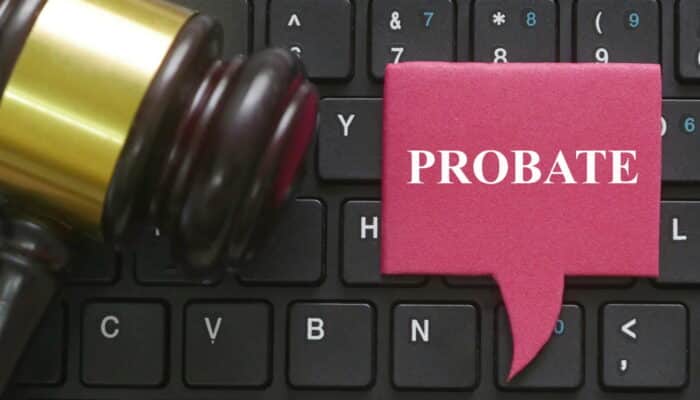PROBATE is the legal transfer of ownership of assets from a deceased party to the living, whether heirs or beneficiaries, or creditors, etc.
There are three (3) types of probate administration under Florida law: formal administration and summary administration as well as a non-court supervised administration proceeding called “Disposition of Personal Property Without Administration.”
A formal probate administration usually takes 6-12 months under most circumstances to process. This process includes appointing a personal representative (i.e., the “executor” known in other states), a 90-day creditor’s period that must run, payment of creditor’s claims and more.
In Florida, a person can avoid probate by using joint ownership with rights of survivorship, beneficiary accounts, lady bird deeds, and living trusts. Two people may own real estate or personal property as joint tenants with rights of survivorship (or JTWROS).
Formal administration is required for any estate with non-exempt assets valued at over $75,000 when a decedent or deceased party has been dead for less than two (2) years. A formal administration is also required any time that a personal representative is needed to settle the affairs or act on behalf of the decedent.
Probate assets include, but are not limited to, the following: a bank account or investment account in the sole name of a decedent or deceased party. A life insurance policy, annuity contract, or individual retirement account payable to the decedent’s estate.
If an Estate is valued above the Probate threshold, and the assets (everything the deceased party owned) were held in the deceased’s sole name, then Probate will be needed, regardless of whether they left a valid Will.
State laws may vary slightly, but the typical scheme of most states, including Florida (F.S. §732.101 to §732.111), is that intestate property (without a valid Last Will) passes in the following order (sometimes known as next of kin): spouse, lineal descendants (children or grandchildren), parents, siblings (and children of deceased siblings).
An inheritance tax, also called an estate tax, is a tax based on the wealth of a deceased person. Florida does not have an inheritance tax, consequently, the Florida’s inheritance tax rate is zero. A beneficiary of a deceased person in Florida does not owe any state taxes on inherited property.
As far as the need for a lawyer for Florida Probate, the answer should be-Yes. In nearly all cases, a person will need a Florida Probate Lawyer. Except for “disposition without administration” (very small estates) and those estates in which the personal representative) is the sole beneficiary, Florida law requires the assistance of an attorney.
To begin or initiate the probate process, a petition for probate must be filed with the clerk of the Florida circuit court in the county where the deceased testator (creator of the Last Will & Testament) resided and the Last Will must be admitted to probate.
The personal representative of the estate as designated in the Last Will is then appointed by the court. If a Last Will & Testament is not present or a personal representative of the estate is not named, a person may petition the court to be assigned as the personal representative of the estate. If the court appoints someone as the personal representative of the estate, said individual will be issued Letters of Administration by the court. These letters of administration give said person the authority to settle or act on behalf of the estate.
As the personal representative of the estate, one must then provide notice of the probate to all interested parties. This includes notifying beneficiaries and heirs of probate. The personal representative must also publish a Notice to Creditors which notifies creditors of the probate of the estate. If the deceased party died age 55 or older, a Notice to Creditors must also be sent to Florida Medicaid/AHCA (Agency for Health Care Administration), regardless of whether it is known if the decedent received any such benefits during their lifetime. This Notice to Creditors must specify the date by which creditors must give their claims.
The next step for the personal representative is to ensure that the final expenses of the deceased are paid for out of the estate, that any required taxes are paid, and that any outstanding debts are paid from the estate. There is a specific order in which outstanding debts and creditors must be paid with some claims taking precedence over others so that if there is not enough in the estate to cover all debts, those that take priority will be paid first.
Once debts, taxes, and final expenses have been taken paid or resolved, the personal representative of the estate must petition the court for permission to transfer the remaining assets of the estate to the beneficiaries as indicated in the Last Will. If there was no Will present, the assets must be distributed as dictated by Florida state law. The estate is then concluded.
The best way to make sure that the administration of an estate is done correctly is to consult a probate attorney. With a probate attorney assisting the personal representative, one can ensure that they do not miss important deadlines or skip necessary steps in the probate process that could hold up the probate process or cause complications.
Some of the most common mistakes that are made and steps that are forgotten when a probate attorney is not hired to assist with probate include:
- Waiting too long to start the probate process.
- Not maintaining an open line of communication with heirs and beneficiaries of an estate.
- Not keeping an accurate inventory of estate assets.
- Failing to educate oneself on the probate process so that one can know what to expect from the process;
- Procrastinating on any part of the probate process;
- Failing to file a 706 Federal Estate Tax Return when applicable;
- Failure to secure assets of the estate;
- Failing to identify property that is exempt from probate;
- Failing to make the proper notifications to creditors;
- Failure to keep proper accounting of expenses incurred during the probate process;
- Failing to get the “approval or authorization” from the court to distribute assets among heirs and beneficiaries of an estate;
- Waiting too long to market real estate;
- Failing to conclude the estate;
- Paying creditors and claims against the estate improperly or in the wrong order;
- Filing a Last Will that is not the most recent version of the Last Will; and
- Failing to claim or properly utilize the available family allowance.
The foregoing is a brief general overview of the probate process.
If you have any additional Questions regarding the foregoing or have any legal issue or concern, please contact the law firm of CASERTA & SPIRITI in Miami Lakes, Florida.
Top of Form




